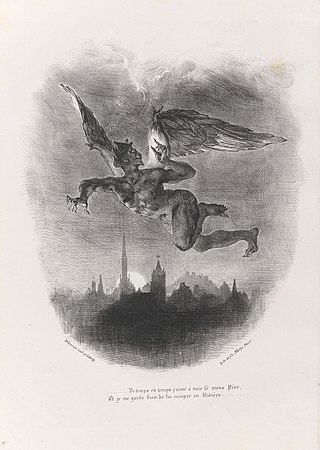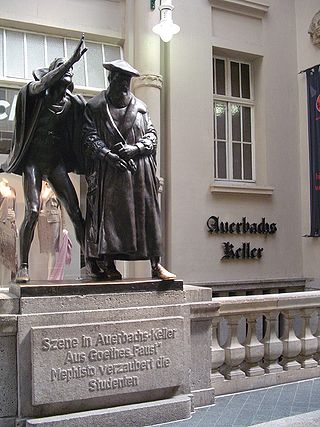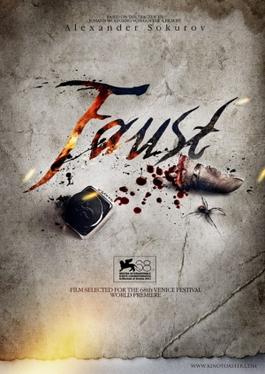
Faust is the protagonist of a classic German legend based on the historical Johann Georg Faust.

Mephistopheles, also known as Mephisto, is a demon featured in German folklore. He originally appeared in literature as the demon in the Faust legend and has since become a stock character appearing in other works of arts and popular culture.

La damnation de Faust, Op. 24 is a work for four solo voices, full seven-part chorus, large children's chorus and orchestra by the French composer Hector Berlioz. He called it a "légende dramatique". It was first performed at the Opéra-Comique in Paris on 6 December 1846.

Faust is a tragic play in two parts by Johann Wolfgang von Goethe, usually known in English as Faust, Part One and Faust, Part Two. Nearly all of Part One and the majority of Part Two are written in rhymed verse. Although rarely staged in its entirety, it is the play with the largest audience numbers on German-language stages. Faust is considered by many to be Goethe's magnum opus and the greatest work of German literature.

Faust is an opera in five acts by Charles Gounod to a French libretto by Jules Barbier and Michel Carré from Carré's play Faust et Marguerite, in turn loosely based on Johann Wolfgang von Goethe's Faust, Part One. It debuted at the Théâtre Lyrique on the Boulevard du Temple in Paris on 19 March 1859, with influential sets designed by Charles-Antoine Cambon and Joseph Thierry, Jean Émile Daran, Édouard Desplechin, and Philippe Chaperon.

Gustaf Gründgens, born Gustav Heinrich Arnold Gründgens, was one of Germany's most famous and influential actors of the 20th century, and artistic director of theatres in Berlin, Düsseldorf, and Hamburg. His career continued unimpeded through the years of the Nazi regime; the extent to which this can be considered as deliberate collaboration with the Nazis is hotly disputed.

Johann Georg Faust, also known in English as John Faustus, was a German itinerant alchemist, astrologer, and magician of the German Renaissance.

Faust: The Second Part of the Tragedy is the second part of the tragic play Faust by Johann Wolfgang von Goethe. It was published in 1832, the year of Goethe's death.
The Mephisto Waltzes are four waltzes composed by Franz Liszt from 1859 to 1862, from 1880 to 1881, and in 1883 and 1885. Nos. 1 and 2 were composed for orchestra, and later arranged for piano, piano duet and two pianos, whereas nos. 3 and 4 were written for piano only. Of the four, the first is the most popular and has been frequently performed in concert and recorded.

Faust: A Tragedy is the first part of the tragic play Faust by Johann Wolfgang von Goethe, and is considered by many as the greatest work of German literature. It was first published in 1808.
Historia von D. Johann Fausten is an opera by the Russian composer Alfred Schnittke (1934–1998) in three acts, with introduction and epilogue to the German libretto by Jörg Morgener and Alfred Schnittke after the anonymous prose book of the same name.

Werner Johannes Krauss was a German stage and film actor. Krauss dominated the German stage of the early 20th century. However, his participation in the antisemitic propaganda film Jud Süß and his collaboration with the Nazis made him a controversial figure.

Doktor Faust is an opera by Ferruccio Busoni with a German libretto by the composer, based on the myth of Faust. Busoni worked on the opera, which he intended as his masterpiece, between 1916 and 1924, but it was still incomplete at the time of his death. His pupil Philipp Jarnach finished it. More recently, in 1982, Antony Beaumont completed the opera using sketches by Busoni that were previously thought to have been lost. Nancy Chamness published an analysis of the libretto to Doktor Faust and a comparison with Goethe's version.
Faust has inspired artistic and cultural works for over four centuries. The following lists cover various media to include items of historic interest, enduring works of high art, and recent representations in popular culture. The entries represent works that a reader has a reasonable chance of encountering rather than a complete catalog.
This article lists cultural references to Mephistopheles, the fictional devil from Faust and Doctor Faustus who has been used in other pieces of literature, film, comics and music.

Faust is a series of approximately 100 paintings created between 1976 and 1979 by Nabil Kanso. The paintings depict figural compositions in a sequence of scenes whose subjects are loosely based on Goethe’s 1808 play Faust Part One and Part Two.

Faust is a 1960 West German theatrical film directed by Peter Gorski. It is based on Goethe's Faust (1808) and adapted from the theater production at the Deutsches Schauspielhaus in Hamburg. It stars Peter Gorski's adoptive father Gustaf Gründgens as Mephistopheles and Will Quadflieg as Faust, and was chosen as West Germany's official submission to the 33rd Academy Awards for Best Foreign Language Film, but did not manage to receive a nomination. The film also won a Deutscher Filmpreis for an Outstanding Documentary or Cultural Film in 1961.

Faust is a 2011 Russian film directed by Alexander Sokurov. Set in the 19th century, it is a free interpretation of the Faust legend and its respective literary adaptations by both Johann Wolfgang von Goethe (1808) as well as Thomas Mann. The dialogue is in German. The film won the Golden Lion at the 68th Venice International Film Festival. At the 2012 Russian Guild of Film Critics Awards the film was awarded the prizes for Best Film, Best Director, Best Script and Best Male Supporting Actor. It received generally positive reviews from critics.
The Laboratory of Mephistopheles, initially released in Britain and America as Laboratory of Mephistopheles and also known as The Cabinet of Mephistopheles, The Devil's Laboratory, Faust's Laboratory, and The Laboratory of Faust, was an 1897 short silent film directed by Georges Méliès, loosely inspired by the Faust legend.

La damnation de Faust is a 126-minute studio album of Hector Berlioz's légende dramatique, performed by José van Dam, Malcolm King, Kenneth Riegel, Frederica von Stade and the Chicago Symphony Orchestra and Chorus under the direction of Georg Solti. It was released in 1982.















